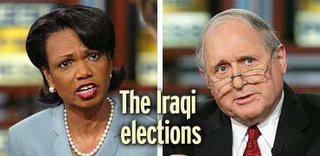More on the President's Wartime Powers and Domestic Spying

This mornings Washington Post has more on President Bush's extension of executive authority. Also, on Meet the Press Tim Russert grilled Secretary of State Rice on the President's authorization of eavesdropping on Americans. Despite Russert's continued questions to Rice about where the President's Constitutional authority to do this comes from, Rice repeatedly would not answer the questions with any specifics as to where his power to spy on Americans is granted in the Constitution. I also thought it was interesting when Russert asked Rice why the administration didn't go through a court to ask for approval in their domestic spying (which he pointed out are rarely turned down). Rice's response was basically the same thing she had been saying, that Bush did it to protect Americans from terrorists, again scurting the main issue that Russert was alluding to, namely the Constitutional question. I will post a link to the transcripts of Meet the Press when they are available, but in the meantime check out this article from the Washington Post:
Defiant in the face of criticism, the Bush administration has portrayed each surveillance initiative as a defense of American freedom. Bush said yesterday that his NSA eavesdropping directives were "critical to saving American lives" and "consistent with U.S. law and the Constitution." After years of portraying an offensive waged largely overseas, Bush justified the internal surveillance with new emphasis on "the home front" and the need to hunt down "terrorists here at home."
Bush's constitutional argument, in the eyes of some legal scholars and previous White House advisers, relies on extraordinary claims of presidential war-making power. Bush said yesterday that the lawfulness of his directives was affirmed by the attorney general and White House counsel, a list that omitted the legislative and judicial branches of government. On occasion the Bush administration has explicitly rejected the authority of courts and Congress to impose boundaries on the power of the commander in chief, describing the president's war-making powers in legal briefs as "plenary" -- a term defined as "full," "complete," and "absolute."
A high-ranking intelligence official with firsthand knowledge said in an interview yesterday that Vice President Cheney, then-Director of Central Intelligence George J. Tenet and Michael V. Hayden, then a lieutenant general and director of the National Security Agency, briefed four key members of Congress about the NSA's new domestic surveillance on Oct. 25, 2001, and Nov. 14, 2001, shortly after Bush signed a highly classified directive that eliminated some restrictions on eavesdropping against U.S. citizens and permanent residents.
In describing the briefings, administration officials made clear that Cheney was announcing a decision, not asking permission from Congress. How much the legislators learned is in dispute.
Click here to read the article.
--Tom Hayes



0 Comments:
Post a Comment
<< Home